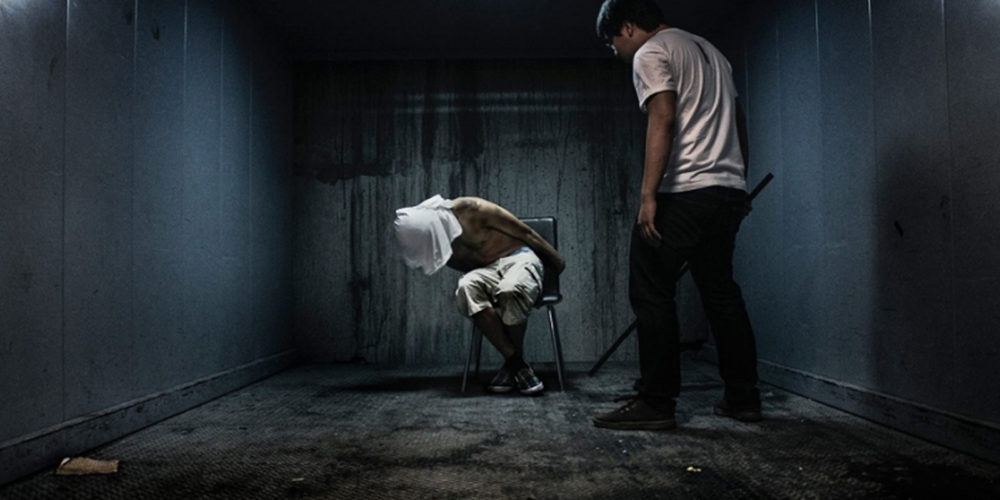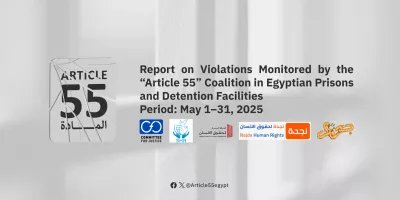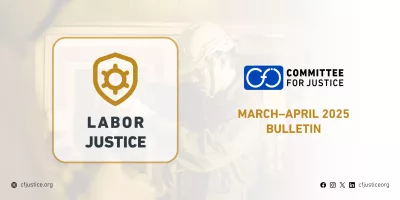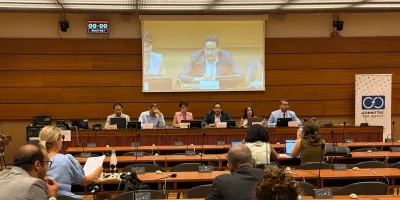The United Nations Committee Against Torture (UNCAT), during its 78th session, reviewed Egypt’s file regarding torture and other forms of cruel treatment, in accordance with Article 20 of the Convention Against Torture signed by Egypt in 1987.
It is noteworthy that Egypt has not participated in the review of its file for the past 20 years. Additionally, in 2017, the UNCAT condemned systemic torture in Egypt, affirming an unavoidable conclusion that torture in Egypt is systematic, and Egyptian authorities have not taken any serious steps to address this issue.
In the recent review, the UNCAT relied on several points highlighted in the shadow report presented by CFJ.
The report identified the most significant flaws and violations concerning torture and its legislation in Egypt, accompanied by several recommendations. Among the main points upon which the committee relied are:
1- Lack of Egyptian Legislative Framework Prohibiting Torture:
One of the key points upon which the UNCAT relied in the shadow report submitted by CFJ is the legislative framework and its definition of torture as a crime in Egypt.
CFJ’s report mentioned that Article 52 of the Egyptian Constitution affirmed that torture is a crime not subject to prescription. However, it did not explicitly confirm an absolute prohibition of torture. Additionally, Article 126 of the Criminal Law does not fully align with the requirements of the Convention Against Torture, as it limits punishment to public officials only. It was required to hold those involved in inciting or consenting to torture or failing to hold the responsible party accountable.
The UNCAT expressed concern in its review of Egypt’s file, stating that there is no definition of the crime of torture in Article 126 of the Egyptian Criminal Law. Moreover, torture is only criminalized when committed against a suspect for the purpose of coercion to confess. The UNCAT also raised concerns that attempts to commit torture, complicity, or participation in torture are not explicitly criminalized. There are also concerns about the lack of a clear provision in Egyptian legislation guaranteeing an absolute and unrestricted prohibition of torture. The principle of command responsibility, or the president’s responsibility for acts of torture committed by subordinates, is not explicitly recognized in local laws.
The UNCAT called on Egypt to consider amending Article 126 of the Criminal Law to ensure full alignment of the definition of torture with Article 1 of the Convention, expanding its scope to include anyone attempting, complicit, or participating in torture. The Committee emphasized the necessity for Egypt to ensure the inclusion of the principle of an absolute prohibition of torture in its legislation and to enforce it rigorously. The Committee urged Egyptian authorities to determine the criminal responsibility of individuals exercising high authority over acts of torture or mistreatment committed by their subordinates when they are aware or should have been aware of such prohibited behavior, and they failed to take necessary measures.
2-Terrorism Laws:
CFJ clarified in its report that the Counterterrorism Law (Law No. 94 of 2015) and the Law on Terrorist Entities (Law No. 8 of 2015) were issued by presidential decrees in the absence of a functioning parliament, constituting the main legal framework regulating counterterrorism efforts in Egypt. Both laws do not provide an explicit definition of the term “terrorism” as a distinct crime; instead, they serve as a means to commit criminal acts. The laws excessively expanded the definition of “terrorists,” “terrorist entities,” and “terrorist crimes.” Additionally, the laws used vague terminology, resulting in a stark increase in arbitrary arrests, enforced disappearances, and intensified suppression campaigns against the basic freedoms of ordinary citizens. Opposition groups and human rights organizations were also banned by being labeled as “terrorist groups.”
CFJ recommended amending the Counterterrorism Law to align with the Convention Against Torture and ensuring that the legal safeguards stipulated in the Egyptian Criminal Procedure Law apply equally to terrorism suspects. This was affirmed by the UNCAT in its review of Egypt’s file, expressing concerns about the laws. The Committee stated that the laws include an overly vague and broad definition of terrorism. Individuals accused of terrorism often face arbitrary arrests, unlawful detention, torture, ill-treatment, and enforced disappearance. Furthermore, the court procedures in terrorism cases frequently lack basic procedural guarantees to ensure fair trials.
The UN committee urged Egypt to review the definition of terrorism in the Counterterrorism Law and the Law on Terrorist Entities to ensure their alignment with international standards and the Convention. It emphasized the need for sufficient and effective legal safeguards and guarantees for fair trials in practice, preventing any arbitrary arrests, unlawful detentions, or enforced disappearances under the guise of counterterrorism efforts.
3-Visits of the Human Rights Council to Detention Facilities:
The shadow report submitted by CFJ to the UNCAT addressed Article 3 (16) of Law No. 197 of 2017, which obliges the National Council for Human Rights to visit prisons and all places of detention, meet with detainees, and submit reports to the Public Prosecutor and the House of Representatives. However, contrary to this law, according to an inquiry conducted by the subcommittee for accreditation affiliated with the Global Alliance of National Human Rights Institutions, the National Center for Human Rights confirmed that prior notification is necessary, and there are no “surprise” visits.
The UNCAT, in turn, expressed concerns about the lack of information regarding any unannounced visits to places of deprivation of liberty by independent mechanisms and the measures taken to implement the recommendations made by monitoring bodies. It noted that the scheduled visits do not allow unrestricted access to detainees or conducting confidential interviews with them.
The UNCAT urged the Egyptian authorities to ensure that monitoring bodies responsible for visiting places of deprivation of liberty can conduct regular, independent, and unannounced visits to all detention facilities. It also called for the establishment of an effective national system to monitor and inspect all places of deprivation of liberty, with follow-up on the results of this systematic monitoring.
4- Use of Force by Law Enforcement:
CFJ affirmed in its report that Article 102 of the Police Law of 1971 explicitly allows the use of firearms to apprehend a convicted person, which may lead to pain or suffering, both of which are permitted under the police law. CFJ recommended the inclusion of a provision in Egyptian legislation explicitly stating the inadmissibility of invoking any exceptional circumstance as a justification for torture. It also recommended a review of the Police Law regarding the use of firearms, specifying the penalty for the use of force by a public official to reflect the severity of the crime, with no option for fines, and considering replacing the death penalty with life imprisonment.
Based on the above, the UNCAT, in its review of Egypt’s file, expressed concerns about repeated allegations of excessive use of force, especially in the context of protests, leading to the killing and injury of hundreds of peaceful protesters. The Committee noted the lack of accountability for police and security personnel regarding the excessive use of force. It emphasized that Egypt’s legal framework on the use of force and firearms by state officials remains inconsistent with international standards, calling on Egypt to review its legislation related to the use of force to align it with international standards.
5- Torture for Obtaining Confessions:
CFJ affirmed that torture and ill-treatment of detainees persist as ongoing practices employed by law enforcement officials against detainees, especially in the early stages of investigations. Confessions obtained under duress continue to be accepted as an ongoing practice.
The UNCAT expressed concern about reports indicating routine use of torture to extract confessions, and confessions obtained through torture are routinely used as evidence against the accused in court. The Committee urged the Egyptian authorities not to accept confessions and statements extracted under torture and to investigate any claims regarding this matter. It emphasized the necessity for mandatory training for all police officers, national security officers, military personnel, judges, and public prosecutors that underscores the link between non-coercive interrogation methods, the prohibition of torture and ill-treatment, and the judiciary’s commitment to overturning confessions and statements obtained under torture.
6-Expansion of Military Courts Jurisdiction and Lack of Judicial Independence:
CFJ noted that Egypt has not commented on the unprecedented expansion of military courts’ jurisdiction over civilians, known for their authority to detain and interrogate suspects indefinitely using questionable methods with minimal judicial oversight. Military trials lack independence and neutrality as they are formed and managed by military bodies. Consequently, they do not belong to the independent judiciary, making their judgments politically motivated. Referring cases to military courts often serves political purposes. Additionally, military courts usually lack adherence to due legal procedures and fail to ensure basic standards of a fair trial, including the right to appeal and challenge judgments before the highest court.
The UNCAT commented that the expansion of trying civilians in military courts, based on vague and ambiguous counterterrorism laws, led to a large number of government critics and actual or perceived political opponents, including children, being tried and convicted in these courts. The UNCAT called on Egypt to review its legislation to eliminate military courts’ jurisdiction over civilian trials, including cases involving terrorist acts, and to ensure the systematic application of basic procedural safeguards and fair trial standards by military courts.
7-Expansion of the Death Penalty:
CFJ clarified in its report that the list of crimes punishable by death under Egyptian penal law, anti-narcotics law, and counterterrorism law is broad and alarming. It pointed out that Egyptian terrorism laws have expanded the use of the death penalty, documenting cases related to the systematic use of capital punishment in politically charged cases.
The UNCAT recommended a permanent moratorium on the death penalty, with a reduction of death sentences to imprisonment. While awaiting these reductions, it called for ensuring that the death penalty is only imposed for crimes falling within the category of “most serious crimes” and after trials fully compliant with international standards for a fair trial.
The UN committee expressed significant concern that Egyptian law imposes the death penalty for a large number of crimes, including relatively less serious offenses that do not involve intentional murder. It raised fears regarding reports that these sentences are predominantly issued under counterterrorism legislation, often without due legal procedures and guarantees of a fair trial.
The UNCAT urged Egypt to reconsider its policies, aiming to reduce the number of crimes punishable by death, abolish the death penalty in law, or take positive steps to impose an optional moratorium on the death penalty and move towards commuting death sentences to life imprisonment. The UN committee also called on Egypt to take all necessary measures, including legislative actions, to ensure that the death penalty is not mandatory at all and to amend its laws, including counterterrorism and related legislation that may involve the imposition of the death penalty.






